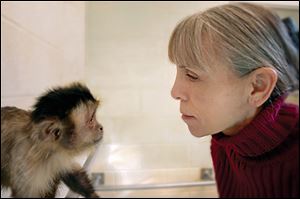
College in Ohio sends monkeys into retirement
7/7/2014
Claudia Thompson is a psychology professor at the College of Wooster who started Wooster’s monkey colony. The capuchin monkeys are retiring to Florida.
WOOSTER, Ohio — Alex, Jake, and Gizmo have worked for more than 30 years. Now they’re heading to Florida for retirement.
The College of Wooster is retiring its last three capuchin monkeys this month to the nonprofit Jungle Friends Primate Sanctuary in Gainesville, Fla.
The Wooster monkeys will join about 200 other monkeys that have been surrendered or abandoned as pets or that have been released from research laboratories.
“This is what I could have dreamed for them,” said Claudia Thompson, the psychology professor who started Wooster’s monkey colony.
Ms. Thompson happened on monkey research by accident.
She came to the private Ohio college three decades ago after a stint in corporate research — with humans — and a plan to do research with rats or birds.
But a lab in Chicago was closing its 45-monkey colony and offered small groups of the animals to young researchers just getting started.
Ms. Thompson, a psychologist interested in noninvasive studies of animal intelligence and behavior, took the lab up on its offer, driving to Chicago with a student to “adopt” the first members of Wooster’s monkey colony.
That was about 20 monkeys ago. While the original inhabitants have long since passed on, Ms. Thompson and about 100 students a year have conducted dozens of experiments about how the monkeys handle tools, work together, and make decisions.
They work with the monkeys in their “home” — a basement room with two windows to the outside; a web of chains on which to climb; toys that include a child’s plastic dump truck and a ball; and a “penthouse” atop the entrance to their quarters.
A one-way mirror provides researchers with an easy way to observe them.
The monkeys are receptive to people they know, although they are far from tame.
But they are getting on in years — each is about 30 — and Alex and Gizmo have diabetes.
“If I waited too much longer, it would be too difficult for them to make the trip to Florida,” Ms. Thompson said.
So Ms. Thompson appealed to Jungle Friends, which specializes in the care of monkeys with special needs. The nonprofit agreed to take over their care in mid-July.
Alex, the dominant monkey, and Jake and Gizmo, who, despite their names, are female.
For the first time, they will be living in an outdoor habitat with grass and mulch to encourage foraging, and trees, as well as plants, shrubs, and bamboo for additional enrichment.
The Wooster monkeys will join an ever-growing population of monkeys at Jungle Friends. Many of them retired from research and more are seeking placement all the time.